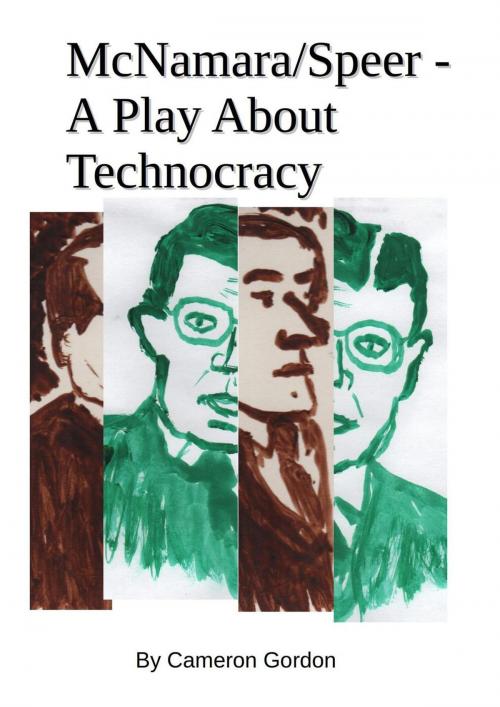McNamara/Speer. A Play About Technocracy
The MacSpeer project, #1
Nonfiction, History, Military, Vietnam War, Asian, World War II| Author: | Cameron Gordon | ISBN: | 9781386974833 |
| Publisher: | Cameron Gordon | Publication: | April 23, 2018 |
| Imprint: | Language: | English |
| Author: | Cameron Gordon |
| ISBN: | 9781386974833 |
| Publisher: | Cameron Gordon |
| Publication: | April 23, 2018 |
| Imprint: | |
| Language: | English |
FROM THE PLAY:
Robert McNamara: (Visibly stunned, his mouth slightly gaping.) Speer? Albert Speer? The Nazi?
Albert Speer: (A bit discomfited.) A Nazi? I am a member of the National Socialist Party, yes. As an official of government and in my capacity I am bound to be. But a 'Nazi', that is a term you Americans use. In Germany this is a vulgarism. I can assure you that I am not a vulgar man.
Robert McNamara: (Suddenly angry.) You dirty Communist bastard! I see your filthy propaganda game. Do you think there is any comparison between myself and the mission of the United States Armed Forces, and the war machine and jackboot government of Nazi Germany? You Communists are a clever bunch. I'll tell you this technique won't work on me!
----
Two men, managers, respectively, of the Vietnam War (US Secretary of Defense, Robert McNamara) and Albert Speer (Armaments Minister under Hitler) find themselves together and trapped in a waiting room of a ghostly netherworld station. They are forced to face their respective pasts and the broader issues of lending their considerable technocratic expertise to morally dubious enterprises of war. Bombings, talking dolls, crackling televisions announcing wartime disasters are among the twists and turns thrown their way. Will they discern the purpose of their strange exile before it is too late -- for them, and for us?
----
The theme explored in this play is how technocracy and war make strange, and contradictory, bedfellows. War is one of the most non-rational of human enterprises. Yet the industrial and technological scale of modern war requires critical masses of expertise and managerial skill which are based on a premise that the world is linear, rational, and manageable. Albert Speer and Robert McNamara were quintessential technocratic managers who believed in the power of numbers and high-concept thinking to prosecute their wars 'efficiently' and 'successfully'. This approach, however, got their countries into deep practical, moral and ethical trouble. This play is a study of this dilemma, raising questions more generally about the nature and meaning of the modern technocracy and the technocratic types it creates and requires.
This play has a had a dramatic reading in New York. It is copyrighted but allows for royalty-free amateur and educational performances. The book also contains a detailed history of its development from idea to script to staging, with selected notes about the performance. Thus it can also be useful for the study of dramaturgy and script writing.
FROM THE PLAY:
Robert McNamara: (Visibly stunned, his mouth slightly gaping.) Speer? Albert Speer? The Nazi?
Albert Speer: (A bit discomfited.) A Nazi? I am a member of the National Socialist Party, yes. As an official of government and in my capacity I am bound to be. But a 'Nazi', that is a term you Americans use. In Germany this is a vulgarism. I can assure you that I am not a vulgar man.
Robert McNamara: (Suddenly angry.) You dirty Communist bastard! I see your filthy propaganda game. Do you think there is any comparison between myself and the mission of the United States Armed Forces, and the war machine and jackboot government of Nazi Germany? You Communists are a clever bunch. I'll tell you this technique won't work on me!
----
Two men, managers, respectively, of the Vietnam War (US Secretary of Defense, Robert McNamara) and Albert Speer (Armaments Minister under Hitler) find themselves together and trapped in a waiting room of a ghostly netherworld station. They are forced to face their respective pasts and the broader issues of lending their considerable technocratic expertise to morally dubious enterprises of war. Bombings, talking dolls, crackling televisions announcing wartime disasters are among the twists and turns thrown their way. Will they discern the purpose of their strange exile before it is too late -- for them, and for us?
----
The theme explored in this play is how technocracy and war make strange, and contradictory, bedfellows. War is one of the most non-rational of human enterprises. Yet the industrial and technological scale of modern war requires critical masses of expertise and managerial skill which are based on a premise that the world is linear, rational, and manageable. Albert Speer and Robert McNamara were quintessential technocratic managers who believed in the power of numbers and high-concept thinking to prosecute their wars 'efficiently' and 'successfully'. This approach, however, got their countries into deep practical, moral and ethical trouble. This play is a study of this dilemma, raising questions more generally about the nature and meaning of the modern technocracy and the technocratic types it creates and requires.
This play has a had a dramatic reading in New York. It is copyrighted but allows for royalty-free amateur and educational performances. The book also contains a detailed history of its development from idea to script to staging, with selected notes about the performance. Thus it can also be useful for the study of dramaturgy and script writing.















